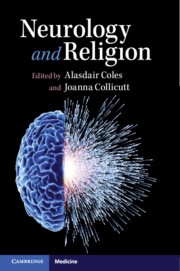Book contents
- Neurology and Religion
- Neurology and Religion
- Copyright page
- Contents
- Contributors
- Preface
- Part I The Neurological Study of Religion
- I.I The Natures of Neurology and Religion
- Chapter 1 The Discipline of Neurology
- Chapter 2 The Scientific Study of Religion
- Chapter 3 Methodological Hazards in the Neuroscientific Study of Religion
- I.II Philosophical and Historical Issues
- Part II Neurology and Religion
- Bibliography
- Index
- References
Chapter 1 - The Discipline of Neurology
from I.I - The Natures of Neurology and Religion
Published online by Cambridge University Press: 28 October 2019
- Neurology and Religion
- Neurology and Religion
- Copyright page
- Contents
- Contributors
- Preface
- Part I The Neurological Study of Religion
- I.I The Natures of Neurology and Religion
- Chapter 1 The Discipline of Neurology
- Chapter 2 The Scientific Study of Religion
- Chapter 3 Methodological Hazards in the Neuroscientific Study of Religion
- I.II Philosophical and Historical Issues
- Part II Neurology and Religion
- Bibliography
- Index
- References
Summary
Neurology is the branch of medicine that deals with disorders of the nervous system. The subject started, in its modern form, with the work of Thomas Willis in seventeenth-century England, as mentioned by Joanna Collicutt in Chapter 2. Willis studied the effects of diseases (for instance stroke) of the brain in people in life, and compared these with their anatomical effects at post-mortem. From these observations, he systematically assembled an account of the hierarchical nature of the nervous system from the peripheral nerves to the spinal cord, and then on through an ascending series of structures in the brain. This clinico-pathological tradition reached its apogee in the work of Jean-Martin Charcot in late nineteenth-century Paris (Clifford Rose 1999). Since then, the imaging and laboratory sciences have increasingly informed our understanding of the normal function of the brain and its diseases.
- Type
- Chapter
- Information
- Neurology and Religion , pp. 1 - 5Publisher: Cambridge University PressPrint publication year: 2019



